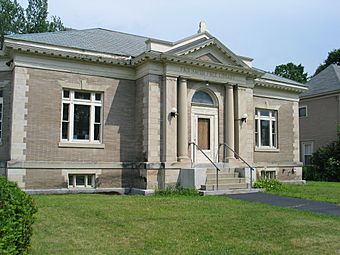Fair Haven Green Historic District facts for kids
Quick facts for kids |
|
|
Fair Haven Green Historic District
|
|

Fair Haven Public Library
|
|
| Location | Park Pl., Adams and Main Sts., Fair Haven, Vermont |
|---|---|
| Area | 24 acres (9.7 ha) |
| Architect | Multiple |
| Architectural style | Greek Revival, Italianate |
| NRHP reference No. | 80000339 |
| Added to NRHP | November 24, 1980 |
The Fair Haven Green Historic District is a special place in Fair Haven, Vermont. It includes the town's main green (a grassy park) and many old, important buildings around it. This area grew a lot after the railroad arrived in 1848. This brought more business from marble and slate quarries nearby. Because of its history, this district was added to the National Register of Historic Places in 1980.
Contents
Discovering Fair Haven Green
Fair Haven is a town in western Rutland County, Vermont. It's right near the border with New York. The town center is located on the north side of the Castleton River.
What the Green Looks Like
The town green is like a big, oval-shaped park with lots of trees. It is surrounded by Main Street and Park Place. Other important roads spread out from the green to the north, east, and south.
Buildings Around the Green
The streets around the green have many different kinds of buildings. You'll see civic buildings (like libraries), homes, and shops. Most of these buildings were built in the second half of the 1800s and early 1900s. There are also some brick shops along Main Street, just south of the green. These are part of the historic district too.
A Glimpse into History
The town of Fair Haven was officially started in 1779. It was first settled in 1783 by a person named Matthew Lyon. He built the town's first mills. He also gave the land that is now the town green.
The Railroad Arrives
For a long time, Fair Haven was mostly a farming town. But in 1848, everything changed. The Rutland and Whitehall Railroad was built through the town. This railroad ran on the south side of the Castleton River.
Marble and Slate Influence
After the railroad came, the marble cutting industry became very important. This industry helped the town grow a lot. You can still see this history today. For example, there are two houses made of marble that face the green.
Important Buildings to See
Many important buildings face the green. These include:
- The public library building (built in 1906). It has a style called neoclassical.
- The Gothic Methodist church (built in 1877). It has a fancy slate roof and trim.
- The Romanesque Baptist church (built between 1870 and 1873).
Many of the homes and shops in the area are built in the Italianate style.



